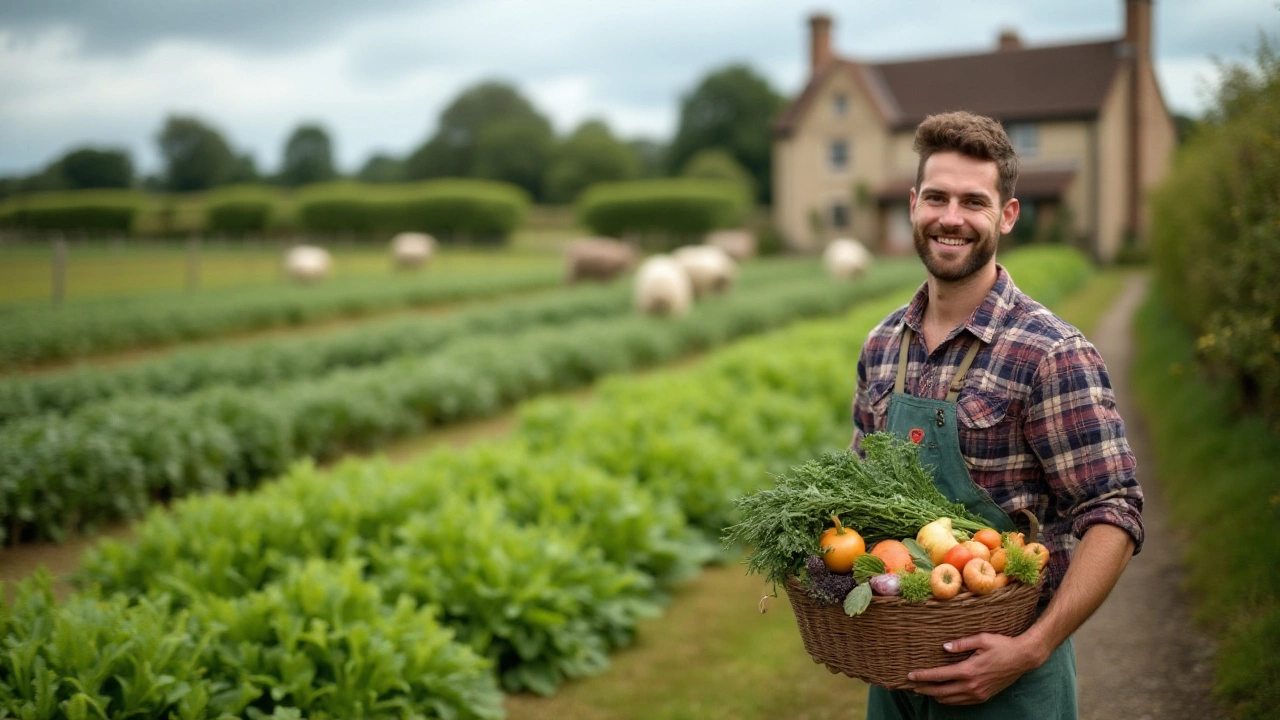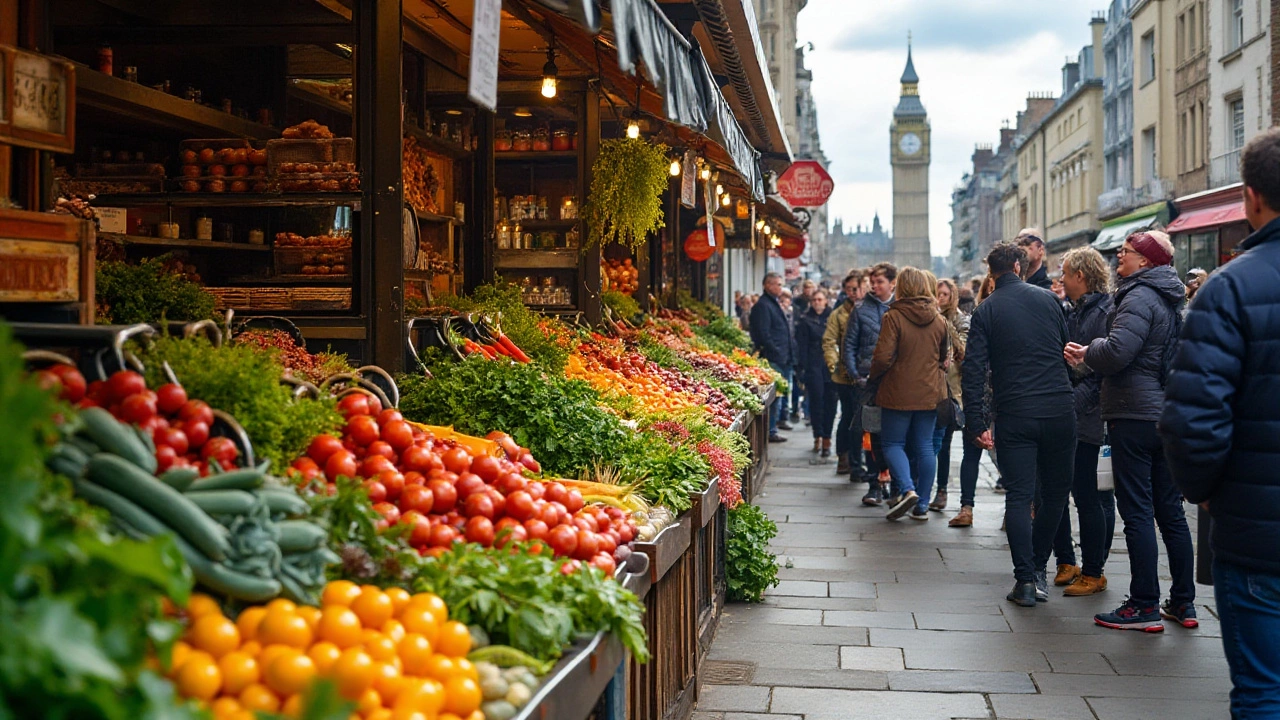As the world shifts towards more sustainable and ethical food choices, vegetarianism is experiencing significant growth. Among various countries embracing this lifestyle, one nation consistently ranks as the ultimate vegetarian destination. Known for its diverse culinary tapestry and rich cultural traditions, this place offers a fascinating glimpse into plant-based living at its finest.
Join us on a journey to explore the country that not only celebrates vegetarianism but has woven it deeply into its daily life and customs. Understand how historical influences and modern practices contribute to creating a haven where vegetables take center stage. Whether you are a seasoned vegetarian or just curious about the lifestyle, this exploration reveals unique insights and delectable recipes ready to inspire your palate.
- The Rise of Vegetarianism Worldwide
- Understanding India: A Vegetarian Wonderland
- Cultural Influences and Religious Practices
- Popular Vegetarian Dishes
- Tips for Exploring Vegetarian Cuisines Globally
The Rise of Vegetarianism Worldwide
In recent years, vegetarianism has experienced a remarkable surge across the globe. This shift towards plant-based diets is driven by a myriad of factors, each intertwining with the other to create a tapestry of change in global eating habits. Environmental awareness is a major catalyst, with more individuals acknowledging the planet's plight and the impact of livestock farming on our fragile ecosystems. As people strive for a more sustainable future, reducing meat consumption becomes an attractive solution. The rise of vegetarianism isn't limited to the environmentally conscious; health advocates also join the movement, highlighting the benefits of plant-based diets in preventing chronic diseases. Terms like 'heart health' and 'nutrient-rich diets' form part of everyday parlance as scientific studies provide tangible evidence of these benefits.
The accessibility and appeal of vegetarianism have also been significantly enhanced by the rise of creative cuisine. Traditional vegetarian recipes once confined to specific cultures are now widely celebrated and adapted into everyday cooking. A recent survey by IPSOS found that about 10% of the global population identifies as vegetarian, and this number is steadily climbing. This shift isn't only seen in individual practices; major food corporations and local eateries have jumped onto the bandwagon, offering innovative plant-based options to meet the growing demand. This revolution in dining choices goes hand in hand with globalization, enabling people from every corner of the world to experience and enjoy dishes that were once geographically confined.
The cultural embrace of vegetarianism extends beyond the Western Hemisphere. In the bustling streets of Bangkok, vegetarian festivals celebrate plant-based living with gusto, featuring dishes that entice even the most devoted carnivores. Meanwhile, cities like Berlin and Melbourne are renowned for their vibrant vegetarian scenes, a testament to the worldwide culinary adaptation. Indeed, as the world becomes more interconnected, so does the sharing and hybridization of vegetarian cuisines. Advocates often cite ethical considerations as a backbone for their dietary choices.
The philosopher Peter Singer astutely notes, "The way we treat animals is a powerful link to how we treat each other; a vegetarian lifestyle recognizes the intrinsic value of all living beings."This sentiment resonates deeply among those who practice or promote vegetarianism from a humanitarian perspective, acknowledging the connection between diet and ethics.
Understanding India: A Vegetarian Wonderland
India's profound connection to vegetarianism is rooted in a complex tapestry of history, culture, and faith. The country boasts one of the world's largest vegetarian populations, with millions opting for plant-based diets due to religious beliefs, historical traditions, and philosophical principles. Hinduism, Jainism, and Buddhism—the dominant religions in the country—extol the virtues of vegetarian living, significantly shaping dietary practices and culinary traditions. This cultural foundation has created a vegetarian haven where nearly every meal celebrates the abundance of plant-based ingredients, from lentils to legumes, and showcases the rich diversity of flavors that come with them.
It's fascinating to see how regional variations play a pivotal role in India's vegetarian landscape. From the spicy sambars and dosas of the southern states to the creamy curries and naan of the north, each region offers its own unique twist on vegetarian recipes. The Indian subcontinent is home to an incredibly varied palette, where the use of spices like turmeric, cumin, coriander, and garam masala transforms simple vegetables into aromatic feasts.
"In India, food preparation is an art, a cultural expression." So writes Madhur Jaffrey, an authoritative voice on Indian cuisine, underscoring the intricate relationship between the people and their food.Across sprawling farms, bustling marketplaces, and humble homes, vegetarian dishes are not just a choice but a way of life.
To illustrate the diversity and richness of this culinary tradition, consider a dish like paneer tikka, a popular North Indian delight. This vegetarian version of a barbecue skewers chunks of fresh paneer cheese marinated in spices and yogurt before being grilled to perfection. Alternatively, the southern dish Avial combines a medley of vegetables with coconut oil and curry leaves, creating a wholesome dish brimming with tropical flavors. Not just for locals, India's vegetarian fare captivates palates worldwide, with international communities increasingly adopting these sumptuous meals for their nutrition and taste.
The Indian government plays a supportive role in promoting vegetarianism as well, recognizing its health benefits and ecological sustainability. Initiatives encouraging the growth of organic vegetables and pulses have gained traction, aligning with global movements for sustainable food systems. Additionally, cities like Chennai have become bantustans for vegan eateries, grabbing global attention for their extensive range of plant-based offerings. Such movements encapsulate India's legion's deep commitment to ethical and eco-friendly living, an essential part of why it's regarded as the leading vegetarian country globally.
The wealth of data supporting India's status as a vegetarian wonderland is compelling. According to a 2023 survey by the Food and Agriculture Organization, almost 40% of Indians between the ages of 15 and 49 reported strict adherence to vegetarian diets. And it isn't just about the numbers; the depth of knowledge, skills, and customs tied to this lifestyle underscores why India stands preeminent among top vegetarian destinations.

Cultural Influences and Religious Practices
Delving into the heart of vegetarianism in India, it becomes clear how much culture and religion have shaped its widespread acceptance and practice. It's a nation where spirituality and daily life coalesce seamlessly, and this fusion has resulted in a strong penchant for plant-based living. The roots of vegetarianism can be traced back to ancient texts and philosophies, with Hinduism, Buddhism, and Jainism advocating non-violence or 'Ahimsa' as an ethical principle. This notion promotes a compassionate lifestyle, encouraging millions to embrace vegetarian diets as an expression of respect for all living beings. The sacred cow, revered in Hinduism, highlights the importance placed on preserving animal life. This belief system not only prevents harm to cattle but also leads to innovative culinary traditions that exclude meat.
Religious observances further embed plant-based diets in the Indian psyche. Several festivals involve fasting periods where meat consumption is avoided, highlighting vegetables and legumes in festive dishes. Celebrations such as Navaratri, Diwali, and Janmashtami often feature communal meals rich in grains, dairy, and fresh produce, making them vegetarian by design. Such rituals enhance the significance of a vegetarian lifestyle not just as a dietary choice but as a cultural identity. Many families, regardless of modern influences, maintain these traditions, perpetuating vegetarianism through generations.
Ethical vegetarianism is not only confined to religious motives. It has a profound cultural impact, contributing to India's distinctive cuisine. The diverse climate across regions offers an array of produce, allowing each state to carve its niche in vegetarian cooking. From the rich lentil stews (dal) of the North to the spicy coconut-infused curries of the South, the diversity within vegetarian cuisine is astoundingly expansive. This culinary variety is testimony to a society that, through spiritual and cultural tenets, continues to innovate vegetarian dishes that mesmerize with flavor and nutrition.
"Vegetarianism in India isn't just a dietary preference; it's a way of life influenced by centuries of tradition and philosophical thought," notes food historian K.T. Achaya.
Moreover, the country's overwhelming reliance on plant-based diets is seen as a response to ecological considerations, too. The mindful practices of consuming what is locally available support sustainability. With a global push towards environmental awareness, many nations are now looking at India's extensive history and successful embracement of vegetarianism with interest. When it comes to sustainable eating and living practices, this South Asian country offers a valuable blueprint. Whether it's the nurturing of small kitchen gardens or embracing community farming practices, these traditions offer insightful inspirations that resonate with current global environmental challenges.
Popular Vegetarian Dishes
In a country celebrated as the leading vegetarian destination, the variety of plant-based dishes is as extensive as it is delicious. This nation boasts an impressive array of dishes that have been perfected over centuries, embracing flavors, textures, and aromas that delight culinary enthusiasts worldwide. To begin with, one of the most iconic staples is the humble yet hearty dal. This lentil-based dish comes in numerous variations depending on the region, each offering its own unique taste and aroma. Dal is not just a dish; it's a profound representation of tradition, family, and nourishment.
Another exceptional dish revered by vegetarians in this part of the globe is paneer tikka. This flavorful delicacy features chunks of paneer, a type of fresh cheese, marinated in an exotic mix of spices, then grilled to perfection. The smoky flavor combined with spices makes it a favorite at gatherings and celebrations. It's a testament to how plant-based foods can please even the most devout meat lovers. Speaking of favorites, few can resist the allure of a well-prepared aloo gobi. Made from potatoes and cauliflower cooked with spices like turmeric and cumin, it exudes a warmth and comfort that resonates with many.
Chaat, a delightful snack, exemplifies the creativity embedded in vegetarian cuisine. It features an ever-changing mix of tangy, spicy, and sweet ingredients layered over a base of crispy samosas or crunchy puris. Chaat illustrates how street food can indeed be a celebration of tastes where each bite tells a story. Meanwhile, no exploration of vegetarian wonders would be complete without addressing the diverse bread accompaniments. From soft naan and flaky parathas to paper-thin roti, these breads serve as the perfect vessels to scoop and savor curries, dals, and more.
Stepping into a more substantial realm, biryani takes on a special role. Although traditionally meat-based, the vegetarian rendition positions vegetables and spices at the forefront, providing depth and richness that satisfies ever-sensitive palates. It's a national dish with regional twists, each contributing to its legacy with its unique spice combinations and cooking methods. The delightful aroma of saffron and the vibrant colors of vegetables mingling with basmati rice create both visual and gastronomical harmony. According to famous chef Madhur Jaffrey, "The vegetarian biryani is not merely a substitute; it stands majestically on its own."
For dessert aficionados, sweets like gulab jamun and jalebi deliver an indulgent ending to the meal. These treats, made from milk solids and flour respectively, soaked in sugary syrups, are a must-try for anyone looking to understand the sweet side of vegetarian recipes. Together, these dishes highlight how varied and fulfilling a vegetarian lifestyle can be in this unique corner of the world, showcasing not just a diet, but a profound culinary heritage that continues to inspire.

Tips for Exploring Vegetarian Cuisines Globally
Diving into the world of vegetarian recipes can be a vibrant and enriching adventure. With the rise of plant-based living across the globe, an increasing number of people are seeking to explore their culinary boundaries. Whether you find yourself at a bustling spice market in India or a quaint vegan café in Berlin, understanding regional specialties can deepen your appreciation and enjoyment of vegetarian food. When stepping into this journey, it's important to familiarize yourself with local ingredients and traditional cooking techniques.
To truly embrace the global landscape of vegetarian country cultures, begin by educating yourself about significant plant-based staples like lentils, chickpeas, and quinoa. These ingredients are not only nutritious but are also deeply embedded in various culinary traditions. Visiting local markets is a fantastic way to experience diverse flavors firsthand. Markets often display an array of fresh, local produce that might not be available in your typical supermarket, offering you the chance to experiment with new textures and tastes in your kitchen.
"Our food should be our medicine and our medicine should be our food." — Hippocrates
While navigating different culinary landscapes, don't hesitate to ask locals for dining recommendations. They are often more than willing to share the best hidden gems for a memorable meal. Engaging with the community not only provides you with more authentic experiences but also enriches your understanding of a culture’s relationship with food. You might stumble upon dishes that aren't on the tourist trail, and discover new recipes along the way. It's worth noting that language barriers can occasionally pose a challenge, but technology steps in to bridge that gap, making it easier than ever to explore vegetarian options wherever you are.
Cooking classes are another fantastic way to immerse yourself in the local plant-based cuisine. They're not just about learning how to prepare specific dishes; they are about capturing the essence of a culture through its food. You’ll gain practical knowledge about blending spices, preparing ingredients, and even selecting the right vegetables to complement each dish. These immersive experiences often reveal secrets and stories behind the recipes, enhancing your culinary prowess.
Key Destinations for Vegetarian Discoveries
There are certain destinations with a strong reputation for catering to vegetarians. For instance, India holds the title as the world's predominant vegetarian country, with millions of citizens adhering to a meat-free lifestyle due in part to cultural and religious influences. The nation offers an unparalleled tapestry of flavors, from the richness of a paneer butter masala in Punjab to the subtlety of coconut-based Tamil Nadu fare. Meanwhile, Thailand’s vibrant street food culture is a delightful haven for vegetarians, as it includes a plethora of fresh herbs, spices, and plant-based ingredients.
When traveling to a new place, consider highlighting certain times of the year when vegetarian festivals might be taking place. These festivals provide delightful opportunities not just for enjoying a variety of dishes, but also for seeing cooking demonstrations and participating in workshops that deepen your culinary skills and understanding. Eating vegetarian is not just about the food itself; it is about the stories, history, and people that create these meals.
Practical Tips
- Always carry a small notepad or smartphone app to jot down recipe inspirations or tips from local chefs.
- Consider using translation apps to effectively communicate your dietary preferences in non-English speaking countries.
- Embrace the street food culture—it's often where you'll find the most authentic and affordable vegetarian options.
- Explore cooking blogs and vlogs from locals before your trip to gain insights and inspiration.
- Carry reusable cutlery and containers to minimize waste and sustain the environment as you savor vegetarian dishes globally.
Remember, exploring global vegetarian cuisines is a journey of discovery that involves cultural appreciation and culinary exploration, bringing back not only delicious recipes but also cherished memories.

